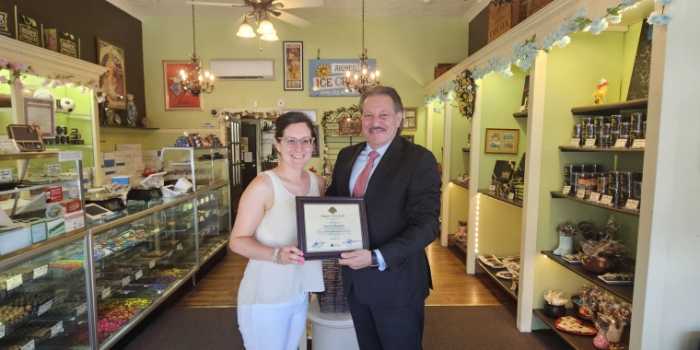By Sarina Trangle
This season’s accoutrement at a storied halal cart in Astoria is sleek, clear and magnetic all over.
Fares Zeideia said he added a credit and debit card processing machine to his King of Falafel cart, which has been stationed near Broadway and 30th Street for a dozen years. The response has rapidly expanded the line that amasses behind his cart during evening hours.
“I see they’re in line feeling for cash and then get out to go to the ATM,” Zeideia said. “The neighborhood completely changed and younger crowds rarely carry cash.”
This assessment resonated with customers, like Lauren Zambelli, who happily handed over a card last week.
“It’s probably the biggest thing they could have done for business,” she said. “No one carries cash anymore.”
Zeideia, 48, said accepting cards required him to hand over about 2.7 percent of customers’ payments to credit card companies, but the fee was worth wooing clientele.
He hypothesized the fee was not behind most of his competitors’ no-card policies, but rather the burden of reporting and paying taxes that comes with it.
“I’m the first open food cart with it, I think,” he said “It’s Uncle Sam people who don’t pay taxes worry about. But I like to keep my Uncle Sam happy.”
Zeideia described the new technology as a natural move for a business that has been at the forefront of street cart strategies.
He claimed his staff began to don shirts with the King of Falafel logo and wear other traditional chef attire before others. He also described his practice of playing Middle Eastern music and belly dancing for waiting customers as unique.
“We were the first to wear these crazy pants with chili peppers on them, out in the middle of the street and playing music and dancing to entertain the customers,” he said.
About a year ago, Zeideia said King of Falafel began to allow customers to call in orders so the food was ready when they stopped by to pick it up. Now he is thinking of adding food delivery service to the menu.
Come September, he is planning to debut a food truck at Broadway and 30th Street and put the cart in storage until he is ready to open a fourth location.
King of Falafel was born out of Zeideia’s frustration over his inability to find what he called quality falafel while driving a cab.
He said he built his business by cooking everything from scratch and drawing on family recipes he covertly learned as a child. Zeideia, who emigrated from Palestine in 1981, said his mother kicked him out of the kitchen because she held traditional beliefs that women, not men, should cook.
Still, he said she came around and even offered him advice here and there as he built up his business.
Today, King of Falafel has three locations: one in midtown Manhattan, a second at 30th Avenue and 53rd Street and the original Astoria location.
The traditional Middle Eastern fare has taken home several awards at the Vendy Cup competition, open to street food vendors, and other cooking competitions.
King of Falafel will be battling other Vendy Cup winners at a new Master’s Cup cook-off later this month, Zeideia said.
Reach reporter Sarina Trangle at 718-260-4546 or by e-mail at strangle@cnglocal.com.



































